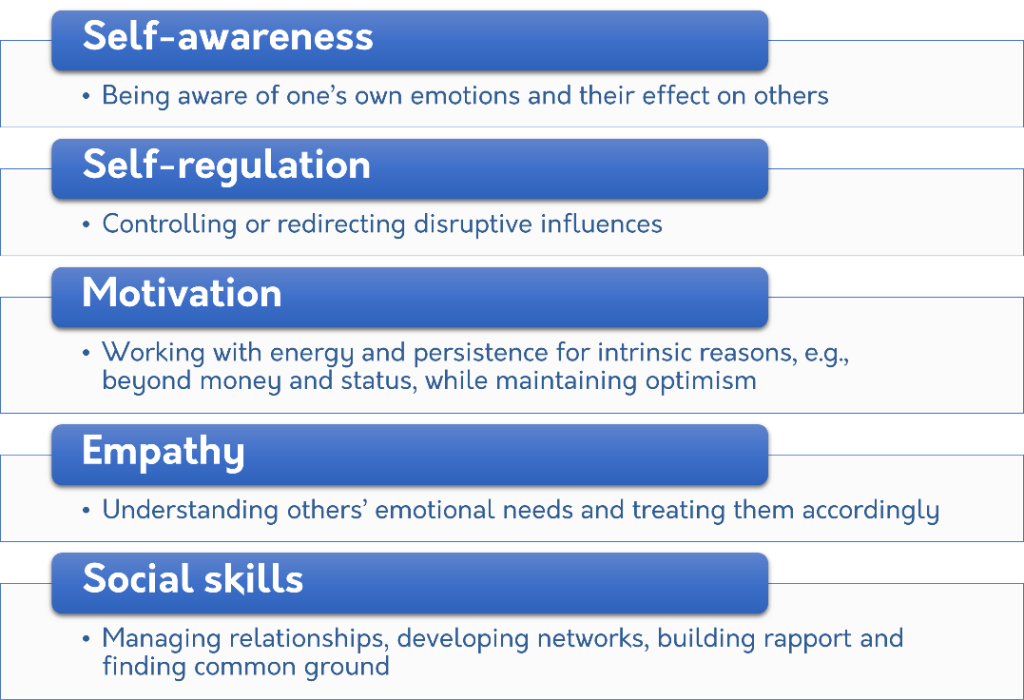Leading With Emotional Intelligence: 5 Ways EQ Makes Better Leaders

Emotional intelligence (EQ) is a critical capacity for leaders to develop. EQ determines the extent to which one remains calm under pressure, effectively resolves conflicts, and responds to colleagues empathetically.
Fundamentally, it’s the ability to understand and manage your emotions while also recognizing and positively influencing the emotions of others.
Executives believe that EQ is crucial for success in:
- Leading teams through times of change (44%)
- Addressing personal issues of employees (37%)
- Giving feedback or employee appraisals (31%)
- Spotting talent (25%)
Leaders with higher EQ are better at assessing the impact of decisions on both customers and employees. They arrive at more balanced conclusions that account for a broader range of perspectives, which helps build support for their decisions.
In contrast to this, lower EQ leaders might focus on “cold objectivity,” emphasize quantitative or non-human aspects of a decision and ignore competing or alternative points of view.
Components of EQ
John Mayer and Peter Salovey first introduced the concept of EQ in 1990, which was subsequently popularized by psychologist Daniel Goleman. Goleman highlighted the importance of EQ in leadership in an article for Harvard Business Review, stating that,
“The most effective leaders are all alike in one crucial way: They all have a high degree of what has come to be known as emotional intelligence. It’s not that IQ and technical skills are irrelevant. They do matter, but…they are the entry-level requirements for executive positions.”
The components of EQ are:

All these areas are interconnected, so making improvements in one will lead to improvements in others.
Increasing Your EQ Will Make You a Better Leader
One of the most compelling results from Daniel Goleman’s research was that EQ is twice as important as technical skills and IQ when it comes to performance excellence. This was particularly true among senior leaders, where 90% of the difference between star performers and average ones was due to EQ factors rather than cognitive abilities.
Here are five ways high EQ leaders stand out from their colleagues:
- Stronger Communication Skills
Leaders with higher emotional intelligence express themselves clearly and concisely. They also listen more attentively than their lower EQ colleagues and leverage empathy when considering how their message is going to be received by others. They are more effective at utilizing and reading non-verbal communication cues, such as body language, tone of voice and facial expressions. This helps them convey their points more powerfully, confidently and effectively while gauging others’ level of buy-in and agreement.
- More Effective Decision Making
High EQ leaders consider the emotional and logical aspects of situations before making decisions. They also anticipate and understand the impact of these decisions on their team members or other key parties. Making decisions that align with the team’s needs and respect their underlying emotional concerns increases the likelihood of acceptance and successful implementation. These leaders explain their rationale clearly and persuasively and effectively address any concerns that arise. Furthermore, their decisions will consider broader perspectives across a wide variety of stakeholders, with consideration and attention given to the ethics of their decision as well as any longer-term impacts on the team’s and company’s culture.
- Better Conflict Resolution
Leaders with high EQ succeed at remaining calm and level-headed, especially in emotionally charged situations or environments. They understand and respect the multiple perspectives through which their colleagues view problems, which is helpful in finding a solution that works for all involved. They use techniques to validate others’ viewpoints, which reduces defensiveness and paves the way for a more open and trusting discussion. At the same time, they express their own views and perspectives clearly and assertively. Resolving conflicts in a fair and respectful way helps team members feel valued, respected and welcomed.
- Increased Resilience
Emotionally intelligent leaders bounce back from setbacks or undesired outcomes more quickly because they take little personally and are better at managing their emotions. Recognizing and regulating their own emotions helps them handle stressful situations without being overwhelmed by them. By being aware of others’ emotions, together with leveraging empathy and stronger communication skills, they also succeed at supporting and encouraging their team members through challenging times, which extends to building a more resilient team culture.
- Stronger Relationships
Leaders with high EQ are better at building and sustaining strong relationships with teammates and colleagues. With a stronger insight into others’ motivations, needs and emotions, they use this understanding to develop deep trust and mutual respect. When employees feel understood by their leaders, it increases the team members’ motivation and engagement with their work.
Additionally, leaders with high EQ demonstrate these personality traits that fortify their connections with others:
- Authenticity and genuineness
- Ability to connect with others on a personal level
- Comfort in sharing their own experiences and vulnerability to “humanize” their relationships and make it easier to get closer to others
As noted earlier, improving in one dimension of EQ results in greater effectiveness in other dimensions. For example, when empathy is enhanced by active listening, it has a ripple effect on social skills that enable a leader to cultivate and nurture strong relationships with others.
Tips for Increasing Your Emotional Intelligence
Here are some tips and strategies you can begin applying today to increase your EQ:
- Practice self-awareness – All growth begins with increased awareness, and that’s especially true for increasing your EQ. Start paying close attention to your thoughts, emotions, and behaviors in all moments, particularly those where you find yourself stressed, angry, or upset. As you reflect on these, you’ll understand more about what pushes your buttons and what happens when they’re pressed. Capture your reflections in a journal.
- Learn to manage your emotions – As you recognize your triggers, develop coping strategies for managing them effectively. Taking a breath, taking a walk, or counting to 10 are all good ways to inject a “pause” between a stimulus and your reaction. Add techniques such as reframing by asking yourself “what else might be going on here” to challenge your initial perceptions.
- Know your “why” – This is the fire in your belly that drives you to do what you do. It’s your core motivation stripped down to its essence. Knowing your core motivations and connecting them to your purpose simplifies your leadership message, while also inspiring and sustaining you to break free from your comfort zone.
- Improve your listening and communication skills – Increasing your understanding of someone else’s point of view demonstrates empathy and helps build lasting trust. Start by bringing curiosity into the mix and shift from listening with the intention to respond to listening to understand. Modify the questions you ask to start with “what” or “how” instead of “why” to make people less defensive while simultaneously validating their perspective. Practice “yes, and…” to build common ground instead of playing “detective,” where you’re listening to poke holes in someone else’s perspective.
EQ in Leadership Benefits Organizations
EQ in leadership benefits organizations daily, and is paramount in successfully leading through change, building resilience and alignment. Leaders practicing and increasing their EQ develop cultures that support increased openness to others’ perspectives, receptivity to generating new ideas, and create a positive work environment to reduce workplace toxicity.
Other ways EQ in leadership benefits organizations include:
- Fostering a culture of ongoing motivation, recognition and engagement.
- Facilitating improved and more informed decision-making that’s built on understanding the impact of decisions on team members and stakeholders.
- Enhancing overall performance through more successful innovation and collaboration.
Leadership Coaching Cultivates EQ
Coaching programs assist executives in gaining awareness of how their behaviors enhance or inhibit their success. Leaders learn how to recognize the situations or behaviors that trigger their stress response, as well as how to pause in the moment and respond as opposed to react. They learn to temper their judgment and replace it with curiosity, to begin understanding or developing perspectives that differ from their initial read.
In addition, coaching helps leaders:
- Connect their response and action to their inner purpose and motivators. Becoming less reliant on external validation will sustain their capacity to perform more effectively.
- Develop their intuitive listening skills and deal productively with others’ emotions and perspectives instead of ignoring, dismissing or invalidating them.
- Build strategies for gaining consensus and finding ground, while developing their appropriate balance between forceful or enabling decision-making.
If you want to improve your EQ and become a top performer, consider leadership coaching. Are you interested in finding out how 4D Executive & Leadership Coaching by Leading Edge can help? Click here to book a complimentary discovery call today.